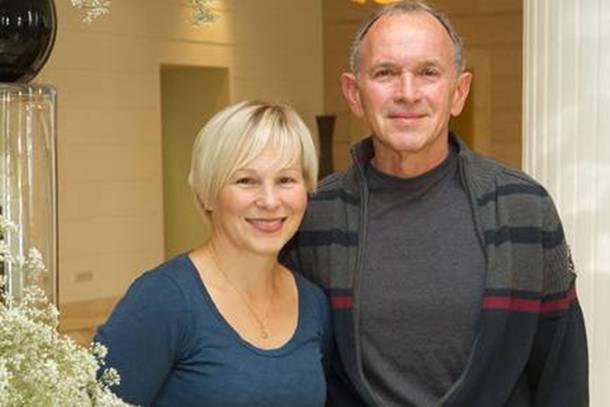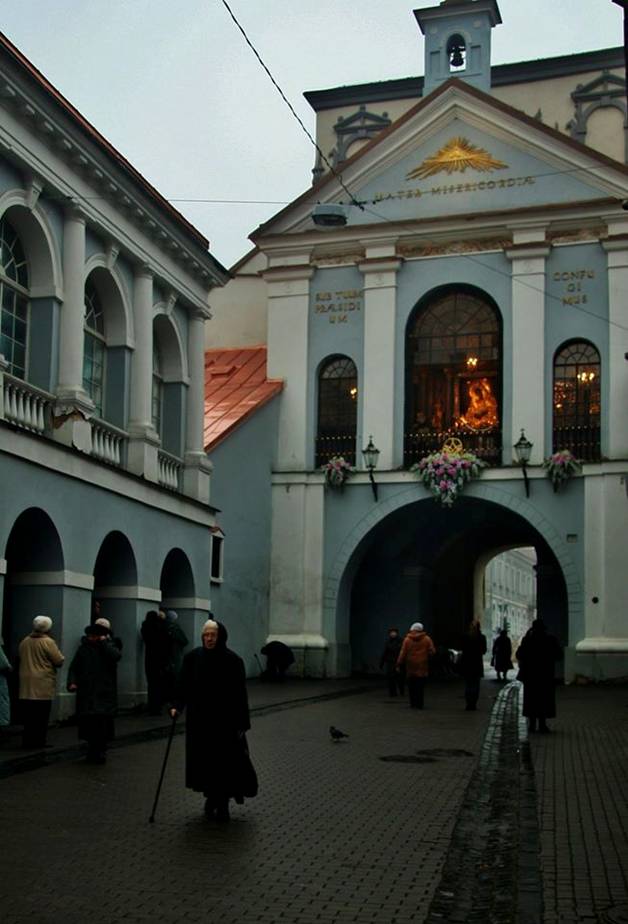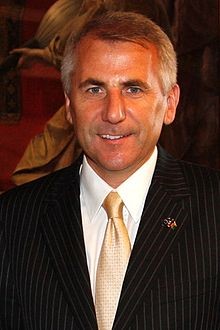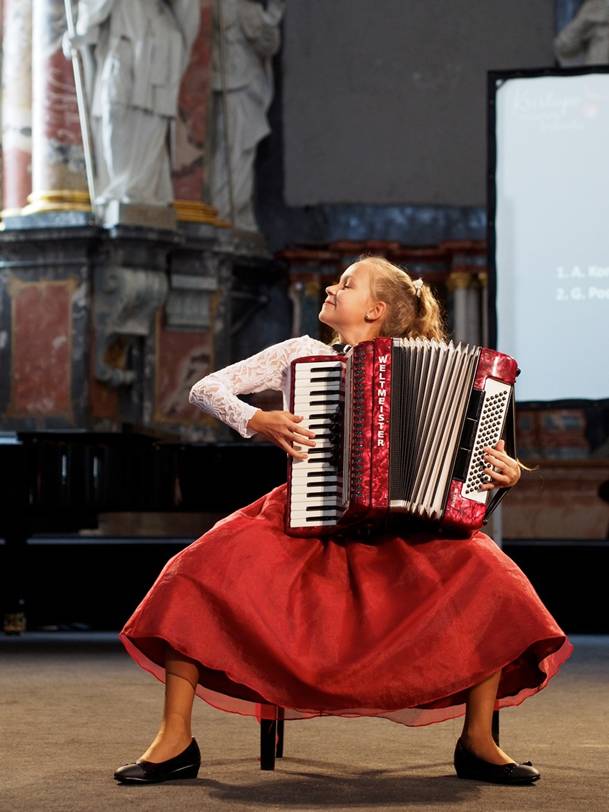
THE VOICE OF INTERNATIONAL LITHUANIA
|
VilNews has its own Google archive! Type a word in the above search box to find any article.
You can also follow us on Facebook. We have two different pages. Click to open and join.
|
Author Archive
- Posted by - (7) Comment
|
Our last day in Lithuania |
|
|
|
|
|
"Our last Day in Lithuania," is an excerpt from GOD, GIVE US WINGS, a riveting memoir by Felicia Prekeris Brown, of her family's struggle to survive World War II in Lithuania and then years in Displaced Person camps in Germany, until with courage and determination they achieve their dream of immigrating to the United States. |
|
|
|
|
- Bookmark :
- Digg
- del.icio.us
- Stumbleupon
- Redit it
- Posted by - (5) Comment
Lifestyle of an American-
Finnish-Lithuanian family

LITHUANIAN-AMERICAN ATTORNEY MARIUS JAKULIS JASON
WITH HIS WIFE LIISA LEITZINGER FROM FINLAND
By Liisa Leitzinger
Our family has lives in Finland, US and Lithuania. All these countries are different, Finland organized and safe, USA multicultural and full of opportunities and Lithuania full of charm and change. The best quality for the money in life is in Lithuania, but also in mental level, Lithuania is still the country where individuals can make a change, individual matters and has a voice. Benefits of a small country.
I came to Lithuania from Finland 20 years ago. Raising three boys, freelance work as a Vilnius city guide for Finnish tourists and keeping an eye on little guest house Mano Liza kept me busy at the beginning, later I got Bachelor’s Degree in history from Vilnius University and was a co-founder of Vilnius International School. Little shop Dancemakers for dance clothing and shoes together with my brother was another niche I found in Lithuanian market. As kids got older and businesses established, I got a bit homesick of Finland and started spending time more there studying for Master’s Degree in Helsinki University. I never get tired of comparing my efficient Scandinavian home to my often bohemian adopted country.
Read more...- Bookmark :
- Digg
- del.icio.us
- Stumbleupon
- Redit it
- Posted by - (0) Comment
More and more young

It has in recent years been focused a lot on young people who emigrate from Lithuania. But the fact is that now there are many young people who travel here to study and work. A dynamic, vibrant environment of young people from many countries is already in full swing, and increasing numbers of youngsters are finding that Lithuania again is about to become the exciting melting pot this country was for centuries.
Foreign youngsters in Vilnius now also have their own Facebook
- Bookmark :
- Digg
- del.icio.us
- Stumbleupon
- Redit it
- Posted by - (2) Comment
A

By Jurate Kutkute Burns
Florida, USA
My most recent visit to Lietuva concluded on September 24th of this year. It was my fifth visit since I first saw my parents’ homeland in 1998 and I can honestly say that each time I come, my appreciation and love for this country grows. Several of my friends in Lietuva have asked me what I think of their country, or city, as they wish to compare their vista with that seen by an outsider. These are my impressions, colored in part by my own parents’ views of what Lietuva meant to them.
First, Lietuva, while geographically small, has an enormous investment in artistic and intellectual capital. Artists, musicians, poets, writers and teachers are appreciated for their talents. Vilniaus Senamiestis is truly an architectural treasure, and each year more of the decayed buildings are being refurbished. Valdovu
- Bookmark :
- Digg
- del.icio.us
- Stumbleupon
- Redit it
- Posted by - (0) Comment
Berta upe Tilmantaite
is among the world's
top photographers

OLEG – THE HUNTER IS A MOVIE BY BERTA UPE TILMANTAITE
SEE HTTPS://VIMEO.COM/81331998
By Aage Myhre
When I spoke with Berta
Berta upe Tilmantaite is a Lithuanian multimedia journalist, photographer and story teller, currently based in Vilnius. She obtained her MA in International Multimedia Journalism from the University of Bolton / Beijing Foreign Studies University (Beijing) after graduating from Vilnius University.
Recently the Asia-Europe Foundation (ASEF) organized an international photography competition "On the Go", and Berta up Tilmantaitė won first place with her photo “On the boat”
B.Tilmantaitės winning photograph will be exhibited in Luxembourg during the 12th Asia-Europe Meeting (ASEM) Foreign Ministers 'Meeting (12th ASEM Foreign Ministers' Meeting).
- Bookmark :
- Digg
- del.icio.us
- Stumbleupon
- Redit it
- Posted by - (0) Comment
|
New VilNews includes a brand new
|
- Bookmark :
- Digg
- del.icio.us
- Stumbleupon
- Redit it
- Posted by - (0) Comment
|
Zalgiris tattoo
|
- Bookmark :
- Digg
- del.icio.us
- Stumbleupon
- Redit it
- Posted by - (0) Comment
Lithuanian countryside home

A PHOTO BY AAGE MYHRE ©
- Bookmark :
- Digg
- del.icio.us
- Stumbleupon
- Redit it
- Posted by - (9) Comment
|
Orthodox Church
|
This Russian Orthodox Church in Vilnius has two names: the Church of Holy Mother, and the Assumption Cathedral. The latter name is used in the church itself. Principal Algirdas, or
- Bookmark :
- Digg
- del.icio.us
- Stumbleupon
- Redit it
- Posted by - (0) Comment
|
Accordion girl
|
- Bookmark :
- Digg
- del.icio.us
- Stumbleupon
- Redit it
- Posted by - (0) Comment
Soviet style apartment...

PHOTO BY PATRICK MURPHY ©
- Bookmark :
- Digg
- del.icio.us
- Stumbleupon
- Redit it
- Posted by - (0) Comment
Apiculture

PHOTO BY PATRICK MURPHY ©
- Bookmark :
- Digg
- del.icio.us
- Stumbleupon
- Redit it
- Posted by - (0) Comment
The Gate of Dawn

A PHOTO BY AAGE MYHRE ©
- Bookmark :
- Digg
- del.icio.us
- Stumbleupon
- Redit it
- Posted by - (0) Comment

A PHOTO BY AAGE MYHRE ©
- Bookmark :
- Digg
- del.icio.us
- Stumbleupon
- Redit it
- Posted by - (0) Comment
|
Musicians on Cathedral Square |
- Bookmark :
- Digg
- del.icio.us
- Stumbleupon
- Redit it
EU-Russia: Facing a new reality
- Posted by - (3) Comment

By Vygaudas Ušackas
EU Ambassador to the Russian Federation
Dear readers of VilNews,
It’s great to see this online resource for people interested in Baltic affairs. I congratulate the editors. From my position as EU Ambassador to Russia, allow me to share some observations.
For a number of years, the EU and Russia had assumed the existence of a strategic partnership, based on the convergence of values, economic integration and increasingly open markets and a modernisation agenda for society.
Our agenda was positive and ambitious. We looked at Russia as a country ready to converge with “European values”, a country likely to embrace both the basic principles of democratic government and a liberal concept of the world order. It was believed this would bring our relations to a new level, covering the whole spectrum of the EU’s strategic relationship with Russia.
In such an environment, Europe’s security architecture, which had been built and maintained for decades – and which the Baltic States are a part of – was seriously undermined by Russia’s illegal annexation of Crimea, followed by the destabilisation of Eastern Ukraine. Our relations became a hostage to the situation in Ukraine.
Rather than coming closer and nurturing the same values, a divide gradually developed between us.
Over the last two years, the quality of EU-Russia relations has been determined neither by our strong mutual interests nor by a common vision, but mainly by our divergence over Ukraine. We have been running the very real and grave risk of falling into the trap of long-term strategic rivalry and competition. We have seen an enlarged rift in our world views and, by extension, in our relationship. This is a very dangerous development. Whether talking about the Eastern Partnership, civil society, human rights, the Maidan, economic policy or sanctions, we have been seeing things differently. It seems that we have been living in a world of misperceptions and delusions.
The Baltic States have a particularly crucial part to play. Acting as a role model and remaining open for contacts and engagements with the Russian society at large, they should reinforce the immunity of our society from political corruption and media manipulation, and keep the socio-economic model strong and attractive. So it is time for solidarity, and I’m happy that we are now enjoying the benefits of the Euro-Atlantic institutions. As the EU is of prime importance in economy, so is NATO for security. NATO and the EU mutually reinforce one another.
Areas of common interest
But of course, the EU and Russia are indispensable international actors. We are interdependent on a wide range of bilateral and multilateral issues, be they trade, energy or global matters, which remind us of the need to agree on common efforts. The Iranian nuclear talks are a good example, where diplomacy in the P5+1 format managed to produce a landmark agreement.
Regarding trade, the EU remains Russia’s main trading partner and its main customer, absorbing nearly half of Russian exports. The EU is by far the largest source of Foreign Direct Investment (FDI) in Russia – about 75% of total FDI stock comes from EU Member States. Based on historical data and the complementarity of our economies, the EU and Russia will remain major economic partners for a long time to come.
The EU and Russia are also the most natural trading partners in energy. The new EU Energy Union Strategy, while advocating diversification of supply, leaves room for continuing competitive energy trade with Russia, based on the principles of open markets, fair competition and environmental protection, to the benefit of both sides.
But currently, the focus falls on Russia’s military operation in Syria, which has recently been accompanied by political outreach. While closely following the developments on the ground, the EU maintains that the only solution for the crisis is a political one.
We have a common interest in putting an end to the bloodshed that has claimed 250,000 lives, and helping the millions of displaced people, for which the Assad regime bears the greatest responsibility. We urge all those international actors with influence over Syria to push for an inclusive political transition. To achieve this, we must bring back stability, promote peace and reconciliation, and create the necessary environment for efficient counter-terrorism efforts, all towards the sovereignty, independence, unity and territorial integrity of the Syrian State.
We depend on one another to address a number of other global and regional challenges including the Middle East Peace Process, the Libyan crisis, Iraq and Afghanistan, but also deep-rooted horizontal challenges such as climate change, international terrorism and migration.
In view of this, we need to try to gradually repair our relations and establish a revised modus vivendi or at least a modus operandi recognising our differences but seeking to work on common interests.
Ukraine – building a wall is not a solution
Constructive engagement on Ukraine, based on respecting the sovereignty and territorial integrity of our common neighbour, would be a step in the right direction. The prerequisite from the EU side for the start of the normalisation process of EU-Russia relations remains unchanged – full implementation of the Minsk Agreement.
While much remains to be done, such as the organisation of local elections in Luhansk and Donetsk according to OSCE standards; the arrangement for self-government; and Ukraine’s regaining of full control of its borders, at the same time we are registering some positive developments: the ceasefire is being largely respected, the withdrawal of heavy weaponry and smaller weapons systems has been implemented and the political process was given a further impetus in the Normandy summit on 2 October 2015..
The Minsk process is moving in the right direction, albeit slowly and sometimes hesitantly. This is no small thing.
The EU will continue to support the process, including via political, financial and in-kind contributions to the OSCE special monitoring mission. We have already contributed to the agreement on the winter gas price for Ukraine, and remain fully engaged on the trilateral talks on the Deep and Comprehensive Free Trade Agreement (DCFTA) implementation, with a view to addressing Russian concerns. I should note that other Eurasian Economic Union members, who also have preferential trade relations with Ukraine, have not expressed similar concerns. Nevertheless, in the spirit of cooperation, the EU is working actively with Russia and Ukraine and is willing to discuss practical arrangements to maintain free and unrestricted trade. At the next trilateral Ministerial meeting, to be held on December 1, we will discuss the way forward and we are counting on Russia to play a constructive role in this process.
Ukraine is and will remain our common neighbour, and has the full right to choose its future trajectory itself, which must be respected by all.
Economic relations and regional cooperation
Our economic relations are far from reaching their full potential because of known facts – the illegal annexation of Crimea, destabilisation in Eastern Ukraine and related EU restrictive measures. Of course, Russia’s own ban on food imports from the EU has had a direct impact on bilateral trade as well. In the case of the Baltic States, I am well aware that local producers have felt the effects directly and have been adapting their businesses to alternative markets. But the main impact is felt by Russians, due to rising food prices and a limited choice of high-quality food products.
In the first half of 2015, EU-Russia trade declined by about 38% in dollar terms, mainly as a result of exchange rate changes, lower international commodity prices and Russia’s economic recession. These factors affect the entirety of Russia’s trade with the world: Russia’s total trade turnover has declined by around 34%.
However, we invite Russia to enjoy the benefits of the EU market, which remains highly attractive for Russia’s classic export – it is low-risk, transparent, diverse and trustworthy. Simultaneously, Russian companies investing in the EU are finding partners for new development and modernisation.
The EU is also following the Eurasian integration processes. We welcome regional economic integration initiatives if they strive towards economic openness and more liberalised trade not only among their members, but also vis-a-vis other partners, in particular neighbouring countries. That would ensure that the Eastern Partnership and the Eurasian Union can coexist without tension. The idea of a free trade agreement between the EU and the Eurasian Union seems appealing given the complementarity of our respective economies. However, it remains a longer-term target which must be premised on a common and proven commitment to economic liberalisation.
Meanwhile, the traditional trade and economic ties between the EU and Russia should be maintained, on the basis of respecting international trade rules.
Science and education cooperation, tourism
In spite of anti-Western rhetoric, so harshly promoted in Russian electronic media, we appreciate the increased interest of Russia’s education and science community to participate in EU-funded programmes. This year, an unprecedented amount of 3500 individuals – staff and students, will be involved in the so-called Erasmus+ international credit mobility scheme, financed by the EU. Russian universities were awarded 45 Jean Monnet grants (university networks connecting scholars and scientists across the world with EU-based universities), the second-highest number of applications by a non-EU country globally, the first being Ukraine. We also help Russian universities develop their curricula. There were 13 joint cooperation projects focusing on curricula development and modernisation of education bringing together 63 academic institutions from Russia. Participating Russian universities span the entire country, from Petrozavodsk to Vladivostok.
The importance of Russia as a neighbour is also reflected in our Cross-Border Cooperation programme. Out of 17 EU co-funded programmes, 8 are with the Russian Federation: 7 land-border and 1 sea-basin (in the Baltic Sea Region), totalling almost €200 million. We also expect Russia will live up to its own commitments within the programmes.
Despite the current tensions, Russia remains by far the country where most Schengen visas are issued (6.9 – almost 7 million in 2013 and 5.8 million in 2014). I always try to use the occasion to invite not only Russians to the EU, but also citizens of the EU to Russia, to explore the numerous natural wonders that Russia offers.
Conclusions
Today, Russia and the West seem to have embarked on different trajectories and are moving at different speeds. We have to be honest in recognizing our differences. The current rift is likely to shape the EU-Russia relationship for some time to come.
However, despite our current difficulties and differences, the EU and Russia share a continent, a common history, our economies are interlinked, and we are our biggest neighbours respectively. We are too important – and too interdependent – to ignore the benefits of a restored relationship and trust.
- Bookmark :
- Digg
- del.icio.us
- Stumbleupon
- Redit it
VilNews e-magazine is published in Vilnius, Lithuania. Editor-in-Chief: Mr. Aage Myhre. Inquires to the editors: editor@VilNews.com.
Code of Ethics: See Section 2 – about VilNews. VilNews is not responsible for content on external links/web pages.
HOW TO ADVERTISE IN VILNEWS.
All content is copyrighted © 2011. UAB ‘VilNews’.

 Click on the buttons to open and read each of VilNews' 18 sub-sections
Click on the buttons to open and read each of VilNews' 18 sub-sections 




















.jpg)



